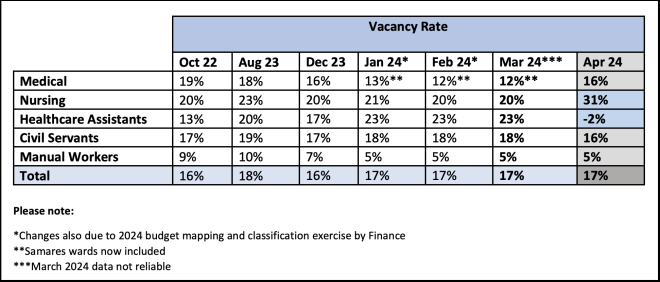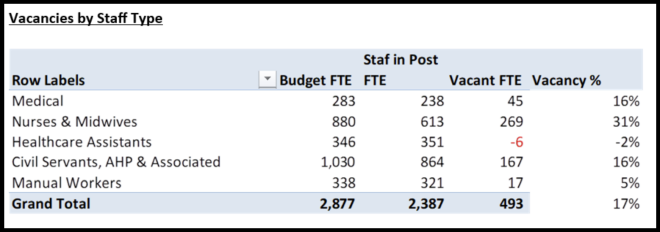


Almost a third of nursing posts in the Health Department are currently empty, a report presented to the Health Advisory Board has revealed.
A workforce report complied ahead of last week's board meeting showed that the nursing vacancy level in the Health Department rose to reach 31% in April.
This means that out of the 880 full-time nursing roles budgeted for, just 613 are filled – leaving total of 269 empty nursing jobs across Health.

Pictured: A workforce report complied ahead of last week's board meeting showed that the nursing vacancy level in the Health Department rose to reach 31% in April.
The nursing vacancy rate was steady between 20-21% from January to March this year, before increasing by a further 10% in April 2024.
However, the report noted that the increase in registered nursing vacancies is offset by the "current over-establishment of healthcare assistants".
As of April 224, there were a total of 351 healthcare assistants in post across Health – five more than the budgeted amount of 346.
The workforce report also raised concerns about "unreliable workforce data", but said that "reliable data should be available in the following months".
In order to tackle the nursing vacancies, a dedicated nurse "recruitment microsite" will also be launched, according to the report.
Work is also ongoing to ensure new permanent staff have access to appropriate temporary accommodation.

Pictured: Out of the 880 full-time nurse and midwife roles, just 613 are filled – leaving total of 269 empty nursing jobs across Health.
In March, nurses and midwives accepted a pay offer of an 8% pay increase for 2024, and a guarantee of RPI +1% for 2025 and 2026.
The offer was accepted by the joint union group – made up of the Royal College of Nurses, the Royal College of Midwives, and the Jersey Nursing Association – which represents nurses and midwives in the island.
The uplift in nurses’ and midwives’ wages and the backpay that they were entitled was paid in May.
But last week's Health Advisory Board meeting, departing Health employees cited cultural issues rather than pay as a the main reason for leaving their roles.

Pictured: In March, nurses and midwives accepted a pay offer of an 8% pay increase for 2024.
The board heard that two-thirds of Health staff said in exit interviews they left due to cultural issues in the department.
Stress, a lack of support, poor career development, dissatisfaction with poor decision-making, unresolved performance and conduct issues, and work-life balance were the most consistent reasons for discontent cited by departing employees.
Carolyn Downs, who chaired the board meeting, said it was “really concerning” that over 66% of those leaving cited what she categorised as “cultural issues”.
Total turnover of staff within HCS remains largely constant.
In the 12-month period to the end of April this year, 167 people left the department, a rate of 6.7%, compared with 6.6% calculated the previous month.
Of these, 111 were voluntary resignations, a rate of 4.5%.
Comments
Comments on this story express the views of the commentator only, not Bailiwick Publishing. We are unable to guarantee the accuracy of any of those comments.